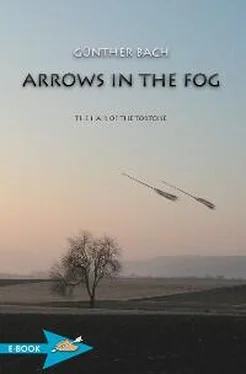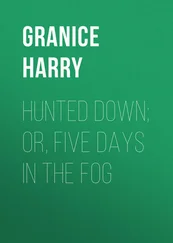Günther Bach - Arrows In The Fog
Здесь есть возможность читать онлайн «Günther Bach - Arrows In The Fog» — ознакомительный отрывок электронной книги совершенно бесплатно, а после прочтения отрывка купить полную версию. В некоторых случаях можно слушать аудио, скачать через торрент в формате fb2 и присутствует краткое содержание. Жанр: unrecognised, на английском языке. Описание произведения, (предисловие) а так же отзывы посетителей доступны на портале библиотеки ЛибКат.
- Название:Arrows In The Fog
- Автор:
- Жанр:
- Год:неизвестен
- ISBN:нет данных
- Рейтинг книги:5 / 5. Голосов: 1
-
Избранное:Добавить в избранное
- Отзывы:
-
Ваша оценка:
- 100
- 1
- 2
- 3
- 4
- 5
Arrows In The Fog: краткое содержание, описание и аннотация
Предлагаем к чтению аннотацию, описание, краткое содержание или предисловие (зависит от того, что написал сам автор книги «Arrows In The Fog»). Если вы не нашли необходимую информацию о книге — напишите в комментариях, мы постараемся отыскать её.
something that you merely know is there?
Rolf thinks that he hears Erhard’s voice saying:
“You must learn to see the invisible clearly!”
In this sequel of the archery novel «The horn of the hare» the story about the two friends continues.
15 years later: Germany is no longer divided and everything has changed, also Bärgers life and his shooting with the bow and arrow.
Arrows In The Fog — читать онлайн ознакомительный отрывок
Ниже представлен текст книги, разбитый по страницам. Система сохранения места последней прочитанной страницы, позволяет с удобством читать онлайн бесплатно книгу «Arrows In The Fog», без необходимости каждый раз заново искать на чём Вы остановились. Поставьте закладку, и сможете в любой момент перейти на страницу, на которой закончили чтение.
Интервал:
Закладка:
The thought made him impatient to get home, and he looked at his watch to estimate how long it would take.
“Do you have something you have to do today?” asked Lothar.
“Oh, yes,” answered Bärger. “I have to study. I have the Japanese course at the high school again this evening.”
Lothar whistled through his teeth.
“Just for your trip?”
Bärger nodded.
“When do you leave?”
“The day after tomorrow,” said Bärger
4
There was enough time after his shower for more than just a quiet pot of green tea.
Bärger went down into his cellar, where the black case with his bow lay on a shelf under a stack of old professional journals. After a short search, he found the mailing tube with the arrows in a corner. He wiped off the dust with a damp cloth and placed both the bow case and the tube on the table in front of him.
He held the shallow tea bowl in both hands and stared at the black case, unable to decide whether to open it.
Why should I, thought Bärger, I have more important things to do. It’s been a long time since I quit, and I probably can’t even draw the bow any more. But the more he resisted, the more he became aware that he was fighting against something that clearly came from within the black case lying in front of him; from something that, in better times, had been almost a part of himself.
He set the tea dish down, opened the zipper with both hands, and pushed back the lid of the case. The reddish-brown wood of the bow had a dull shine as it lay in the crumbling foam padding, once green and now yellowed with age. It was complete with string and bow limbs, and there was even a beat-up finger tab in one of the recesses in the padding.
Bärger hesitated, then reached for the grip section, closed his left hand on the pistol grip, and raised it slowly to eye level. He aimed through the sight window at a point on the wall and tried to remember just how the colorful FITA target had looked. It still didn’t feel right, just to sit there with the bow riser in his hand, aiming over the shelf. Bärger stood up, installed the bow limbs, and tightened the screws. When he picked up the string, he realized that he had forgotten how to string the bow. He tried to remember, but it escaped him. His memory only began to work again when he saw the bow stringer in the case. He placed his left foot in the loop and bent the upper limb across his shoulder until he could string the bow.
Now what he held in his hand was a bow again. Slowly and carefully, he began to pull the string back. He let it down again, then drew it a little further, each time increasing the distance, until he finally dared to draw it all the way and hold it anchored at his chin for two or three seconds.
It’s not my head that remembers, thought Bärger. It is my body that recognizes the bow. He set the bow down on the table in front of him and sat down, looking wonderingly at his hands, as if he couldn’t believe what they had done. When he held the bow at full draw and felt the force flowing from his bow hand across his arms and shoulders to the hand holding the string, it had been like the closing of a circle, like the completion of a whole.
Tension, yes, a natural tension that would be released in the shot, giving an impulse to the arrow and sending it to the point that it should hit if he had done everything right.
There was no doubt that the bow was still in good shape. There was no doubt that he could still draw it. And there was no doubt at all that he wanted to draw it again. That was the important thing, thought Bärger.
He shook the tube with arrows, listening to their gentle clatter. It hadn’t gone away. It had waited for me. But I had almost forgotten it.
Bärger went into the kitchen, turned on the kettle and waited until the water began to boil. Then he turned off the heat and waited until the water in the kettle was still. Slowly he poured it into a small pot, the size and shape of an apple, until the water reached the rim. He glanced at his wristwatch and waited exactly eighty seconds, while he absentmindedly watched the simple reddish/brown pot, with its matt polish from long use. Then, just as slowly and carefully, he poured the tea through a bamboo sieve into the white, shallow bowl. Only then, the tea first took on color, a light, fragrant green fading into yellow at the edge of the bowl.
Bärger picked up the bowl with both hands and held it against the light from the window to look at its noble outline, and then closing his eyes, drank it all down in one swallow. It was time to pack up his books and the loose-leaf notebook. Bärger rinsed out his tea bowl and placed it carefully on a folded kitchen towel. Then he went back into the cellar, unstrung his bow, dismounted the limbs, and placed the pieces back in their case. Not for long, he resolved.
After a glance at his watch, he returned to his office and sat down at his desk to look over the chart with the Japanese syllabic script. He had pinned it to the wall in front of him at eye level so that he would always have it in view. It didn’t seem to work. Nothing did. It is really driving me crazy, thought Bärger. I can’t seem to impress them on my mind. The Japanese lady who taught the course had said that children in Japan begin to read hiragana when they’re five years old. He remembered that when he was a schoolboy, he and one of his schoolmates had learned the cuneiform alphabet in only one day. He still knew it. They had written notes to each other during class and let themselves be caught passing them back and forth, just for the fun of seeing the helpless expression on the face of their teacher, who had no idea what the mysterious symbols meant.
That was a long time ago, thought Bärger. Now he envied three high school girls who sat in front of the classroom and wrote the complicated symbols with ridiculous ease.
He had a good ear, which could detect even slight differences in speech so he could pronounce what he heard correctly, but he was almost ready to give up on the script. Again and again, he had tried to arrange the complicated system of symbols in some system, in some order he could remember, but without success. For him, hiragana was visual chaos. There must be something to the Japanese opinion, thought Bärger, that any European who learns perfect Japanese has to be crazy.
But it was time to go. He shoved the books, his vocabulary book, and his loose-leaf binder into his old, cowhide book bag, which got better looking each year as it aged. He closed the door behind him and made his way to the streetcar stop.
It was a very mixed bunch that came together every week to learn Japanese in the rooms at the old high school. At the beginning, they had all introduced themselves, giving their names, occupations, and reasons for learning the language.
One was a policeman, who wanted, or who had been assigned, to learn the language for professional reasons, and one was a fireman, who was interested in the samurai and especially in their swords. There was a married couple sitting next to Bärger who ran a martial arts school together. A retired man, who hadn’t really been able to explain why he was interested, had quit after the third lesson. As well as the three high school girls who sat in front, two students from another school also attended, explaining that they were preparing for a university language major. He was the only one who was preparing for a trip to Japan, and he was much envied by the others. It was very quickly clear to him that, in the short time he had for the course, he could not acquire enough real knowledge of the language to make himself understood in the country, even at a beginner’s level. The teacher had explained that there would be no problem using English in the cities, but that people in the country normally spoke only Japanese. Only one thing helped him to recover a bit from his disappointment. She explained that the Japanese were very pleased when a foreigner – a gaijin - not only mastered the usual manners, but was also able to express the most important courtesies in words.
Читать дальшеИнтервал:
Закладка:
Похожие книги на «Arrows In The Fog»
Представляем Вашему вниманию похожие книги на «Arrows In The Fog» списком для выбора. Мы отобрали схожую по названию и смыслу литературу в надежде предоставить читателям больше вариантов отыскать новые, интересные, ещё непрочитанные произведения.
Обсуждение, отзывы о книге «Arrows In The Fog» и просто собственные мнения читателей. Оставьте ваши комментарии, напишите, что Вы думаете о произведении, его смысле или главных героях. Укажите что конкретно понравилось, а что нет, и почему Вы так считаете.









